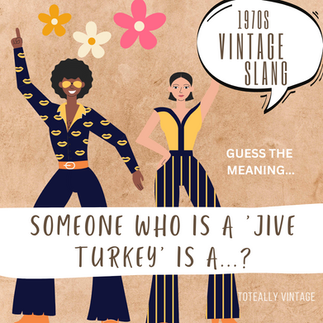CAN YOU GUESS THE VINTAGE SLANG?
- Toteally Vintage
- Apr 4, 2024
- 3 min read
Updated: Jan 8
From the Roaring 20s to the Disco Era and beyond, we look at some fabulous vintage slang and ask: can you guess what the old-time phrases mean?

Every generation strives to be different to the one that came before and one of the ways we mark our uniqueness is by coining new words and phrases that our parents would never use. They just wouldn't be cool enough.
New words and phrases also enter the common lexicon decade by decade, reflecting the cultural zeitgeist of an era.
Think of the epoch-defining Roaring Twenties and the Flower Power of the mellow 1960s. Or the groovy lingo of the 1970s disco age. Chances are you can hear a lot of vintage slang and accurately place it in time.
That's because each decade has its own vocabulary.
And that language is like a time capsule, offering a fascinating window on past worlds and bygone decades.
Retro Slang
The Flapper Girls and jazz musicians of the 1920s Jazz Age brought us the 'cat's pyjamas' and 'the bee's knees' - echoing the excitement and positivity of the time.
In the 1930s people flocked to dance halls to do the 'Susie Q' and 'the Lambeth Walk', seeking light relief in a decade marked by harsh economic conditions and the threat of world war. (Said war also created a whole new set of vintage slang).
Fast forward to the 1970s, and phrases like 'far out' and 'groovy' became emblematic of the disco era, embodying a spirit of optimism and self-expression.
Vintage terms transport us to a different time and place. Some we still use even today - if you've ever said someone cracks you up, you're using vintage slang from the 1930s!
So next time you hear a vintage word or phrase, why not take a moment to appreciate the history and cultural significance behind it? To mangle another idiom, every word tells a story.
(And if you're interested, the original 'every picture tells a story' vintage term dates back to the 1900s and possibly even earlier!)
Can You Guess What This Vintage Slang Means?
Click through the pictures to test yourself. (Answers below)
ANSWERS (see below, warning spoilers!)
Victorian slang: Posh/ smart. Afternoon tea was fashionable in Victorian times and to be 'Afternoonified' was to be associated with the refined lifestyle.
1910 slang: Someone who was an 'Againster' habitually or frequently disagreed with others.
1920s slang: If you're a 'Bad Hoofer', you're a bad dancer. Sorry!
1930s slang: 'Blow your wig' seems to have a double meaning: you're either very excited or you're angry! I guess context is king with this one.
1940s slang: If someone asked 'Hi Sugar, are you rationed', they would ask if you had a boyfriend.
1950s slang: Think square for this one. If you're a 'cube', you're a boring person. Which I'm sure you're not!
1960s slang: 'Don't bogart' something means 'don't hog it' - pass it on. (Often thought to originally refer to a joint or marijuana, encouraging someone to share it.)
1970s slang: If you're a 'jive turkey' you are... unreliable.
1980s slang: Describing something as 'tubular' means it's cool. If you want to stress how excellent it really is, you'd say it's 'totally tubular'.

















